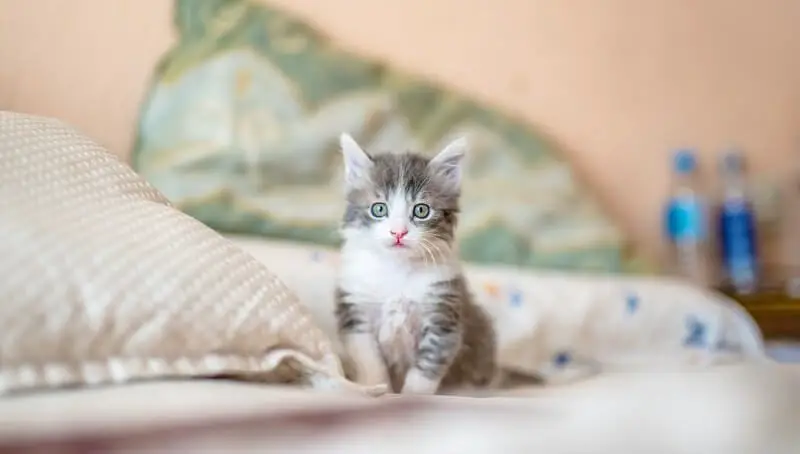
German Shepherd Lifespan
June 17, 2022
Why Do Cats Stick Their Tongues Out?
June 17, 2022
You might be one of the people that have asked themselves this question while trying to decipher their cat’s behavior. So can they? Although this is a diagnosis that is usually reserved for people, there are experts and pet lovers who found a lot of similarities between some cats with special needs and people with diagnosed autism. Keep in mind that usually, cats will only be labeled as having special needs when they have a visible mental or physical disability.
Among the most common behaviors in cats that look very similar to those of humans that are on the autism spectrum are repeating the same actions over and over again, avoiding eye contact, and refusing to be touched or held, among others. If this information is confusing for you then this article is for you. Ițll try to get into detail about what to look for in your cat’s behavior and whether these things mean your cat has autism or not.
First off: What is autism?
We can define autism as a spectrum of behaviors that cause a person to have an inability to function properly in society, interact with others and even communicate to some extent. The spectrum part means that not all persons with autism will experience the same symptoms. Some will have very different behaviors than others depending on where they fall on the spectrum.
You might also like my articles on whether birds can have down syndrome, reasons why cats won’t stop meowing, and what cats hate to walk on.
Even though the symptoms may vary, some of them are commonly found among people with autism and these are repetitive motions and verbal sounds, a need for predictable and organized situations and routines, a difficulty in processing some of the outside stimuli like bright lights, and powerful noises or sounds, and a difficulty to adjust to unexpected changes. A person with autism will also refuse invitations to work or play in groups and will prefer to spend time alone, isolated from other people. Another interesting symptom that people with autism might develop is getting obsessed with a topic, subject, or activity, and having a really hard time thinking of anything else.
Can cats really have autism?
The short answer is NO, cats won’t get autism. They can, instead, develop and get diagnosed with other conditions, and, just like other animals and even people, they can be considered as having special needs. What you should understand is that although mental illnesses are possible, most cats will be considered special needs mostly because of their old age or physical impairments. One example is a cat with two or three limbs. This animal will certainly be classified as having special needs.
Some other common conditions that will make a cat special-needs are complete immobility, deafness, or blindness. Some cats with special needs might even have mental impairment. The reasons behind these conditions can be anything from an older illness to accidents and birth defects. Although cats can’t develop Down syndrome either, they can develop some symptoms tangential with this condition, like uncommon behavior, unusually shaped facial features, poor vision, poor hearing, or wide-set eyes. To find out exactly what is behind these symptoms and how to deal with your companion’s special needs, you will usually need to take it to a vet.
What are the behaviors that are similar to those of autism?
There’s no question that some cats will exhibit a few of the traits found on the autism spectrum. They might get obsessed over catching different things and toys, they will love to spend some time alone, they are easily scared by bright lights and loud noises, and they might also refuse too much affection. On the other hand, cats are highly intelligent and will usually like and follow a routine.
Even though their behavior might sometime point toward this condition, recent research has shown that cats don’t suffer from autism. Some of the noises made by cats might also make their owners think that the pets might have autism. Most of the time, there is clear reasoning behind a cat making a strange noise and these noises differ by breed, so no, weird noises won’t point to autism either.
If your cat is acting very strange, or you suspect something is up, a call with the vet or a wellness checkup is always beneficial. They might be able to identify some lurking issues that explain your cat’s “autistic” behavior.
How can I calm down my cat?
 There are instances where cats are overstimulated, which makes their owners give them a wrong autism diagnosis. Some of the common signs of overstimulation in cats are biting motions, flat ears, and dilated pupils. Some cats might even resort to aggressive hissing when overstimulated. A great way of preventing your cat from becoming overstimulated would be to give it an interesting indoor life. If it gets bored inside, a cat will usually try to escape, and then, the outside world might really overwhelm it.
There are instances where cats are overstimulated, which makes their owners give them a wrong autism diagnosis. Some of the common signs of overstimulation in cats are biting motions, flat ears, and dilated pupils. Some cats might even resort to aggressive hissing when overstimulated. A great way of preventing your cat from becoming overstimulated would be to give it an interesting indoor life. If it gets bored inside, a cat will usually try to escape, and then, the outside world might really overwhelm it.
Keep your cat entertained by always interacting with it. Sacrifice some of your time during the day to play with it and also offer it engaging toys like treat-dispensing devices and prey toys. Don’t just let your cat play alone all day long, as it might become restless, obsessed, and overstimulated.
YOu might have to let your cat cool down if you notice it close to its boiling point. Let it come to you when it will be ready and until then, just stay by their side and let them make the first move.
These animals will also enjoy it if you create a routine and stick to it. This will help reduce any anxiety they might experience related to sudden changes.
Helping a unique cat
Before taking a cat with unique behavior you will have to make sure that your whole family will be ready to help. A supportive environment for your cat will require the help of all of the family members and quite the effort I might add. This will usually mean some adjustments like access to a secluded space for your cat where it can rest without being disturbed and resisting some habits cat owners have like patting and holding the cat.
Summary
If you have issues understanding the behavior of your cat and why it does what it does, you might need to talk to a cat behaviorist. These are people that will have a great deal of knowledge and extensive training in understanding unique traits of cat behavior and they will have great tips for you to understand what is in the mid of your pet. If you don’t know where to find a cat behaviorist you should ask your vet about one.
If you have a very smart cat, but one that is obsessed with its toys and introverted, this doesn’t make it autistic. They might even have some abnormalities that will make it hard for them to participate in normal activities. The special needs of these cats will have them need a lot of caring and nurturing, but as long as you give your best, they will be happy in your family.
